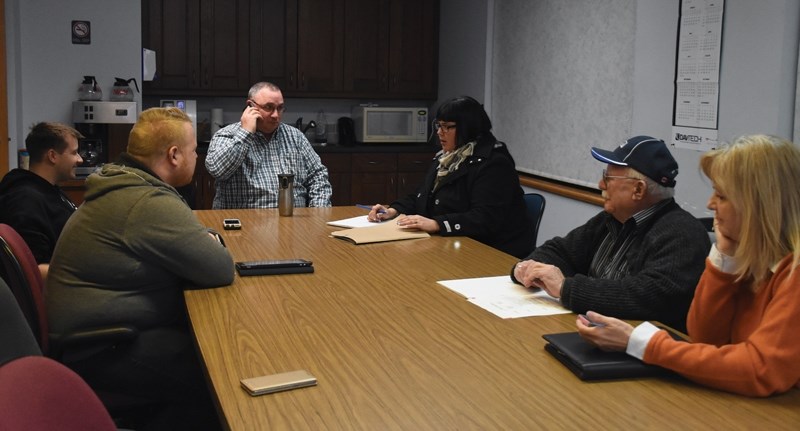The Police Consultation Committee has settled on three priorities for the Westlock RCMP detachment to implement this year.
As part of the detachment’s annual performance plan, the priority issues between April 2017 and March 2018 will be increased police visibility, traffic enforcement, and tackling organized crime and drug offenses.
The committee, made up of local peace officers and RCMP members, representatives from the Town of Westlock and the Village of Clyde, as well as community organizations, met Jan. 18.
The committee held its first meeting in November as a means to gather community input on policing issues and find solutions as a group.
Traffic enforcement
At the meeting, community member John Turnbull identified speeding in the Jarvie area as an issue that fell under the detachment’s traffic priority.
“That’s on everybody’s mind right now,” Turnbull said. “It’s right up on the forefront. Well I know the signs don’t work. Stop signs work. But you know, the 100 km/h is no longer the maximum; it’s the minimum. Travel on (Highway) 44 and no one travels at a 100.”
Town of Westlock Coun. John Shoemaker said the four-way intersection on Main Street has also had problems.
“If we could put a ghost car, or something in that area, or even an empty vehicle, or speed traps once in a while,” he said.
“That to me is one I talk a lot (about) to the residents. A lot of trucks coming through. They just go through that thing on yellows and reds and we haven’t hit anybody yet — or very seldom does someone get hit — but it’s going to happen.”
The committee decided to perform two designated quarterly checkstops, as well as feature a monthly public awareness campaign ranging from pedestrian and seatbelt safety, to impaired driving.
Organized crime
Public education was also agreed on as a necessary component to tackling organized crime and drug offences.
Reminders about neighbours keeping an eye out for rural break-ins and door-to-door salesmen, in order to avoid theft and scams is part of that.
“What’s always got me was the theft of wire,” Shoemaker noted. “Can the police go to the people who sell wire and say, ‘Who did you get this from?’…If I come in every second day with 500 pounds of metal, where am I getting it? It’s coming from somewhere.”
“They’re not going locally,” said Westlock County peace officer Erik Nickolson. “They’re all going into Edmonton.”
Westlock RCMP Staff Sgt. Dwayne Rawson said the y can’t get involved with crimes that happen under another municipal police force.
“It’s been identified through the provinces, trying to get these guys to clean their acts up,” he said.
“If someone comes in there, take their driver’s licence. Run it like a pawnshop where you go into a pawnshop, you have to give your photo ID.”
Rawson said a criminal justice committee is also on the horizon for the area as a way to tackle non-habitual offenders through a form of restorative justice.
Rather than taking up court resources and imposing jail time on non-habitual offenders, the committee uses accountability and community service as a penalty.
For example, if a teen were caught stealing from the grocery store, he would have to meet the victim in front of the committee, listen to how it has impacted the victim, and then apologize and make amends through community service hours.
If they failed to complete those hours, then they would be sent to court.
“They are excellent in the community,” Rawson said.
“I’ve got the OK and I’ve had it for a couple years now, through the Crown’s office to get one going here. I belonged to the one in Athabasca for years and one in Calling Lake for years. Hugely successful. Out of all the ones we took in Athabasca, we had one repeat.”
Sylvia Yoder, executive director for the Hope Resource Centre, said she too was involved with a similar committee in Barrhead.
“The court system, even though sometimes it happens here in Westlock, there isn’t that shame factor,” she noted.
“It’s more personal in a community justice committee because you’re accountable and looking in the face of the person you screwed over.”
Police visibility
At the December meeting it was noted that police visibility was lacking in the community, so the group decided that law enforcement would need to be involved at eight community events this year.
Once the weather warms police will also head out on targeted foot patrols and expand the positive ticketing, which rewards kids for good behaviour like wearing a helmet while biking.
The committee’s third objective will also involve working with seniors and youth.
Initiatives for that area will be decided Feb. 15 but in the meantime, the committee discussed teaching interview skills to high school students so that they could interview a senior and write their history.
The idea of gathering students to trap shoot or bow shoot with an officer was also discussed.



